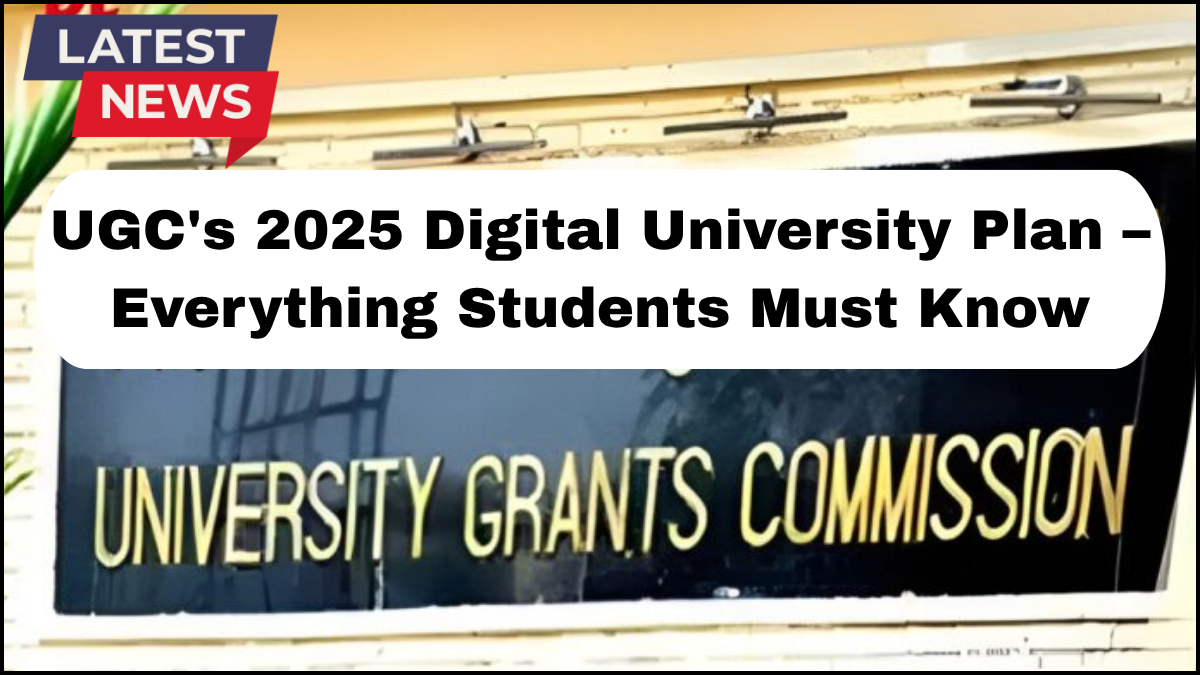In a bold move to reshape higher education in India, the University Grants Commission (UGC) is rolling out its Digital University plan in 2025. Designed to expand access to quality learning across the country, this initiative promises to revolutionize the way students pursue online degrees, certifications, and lifelong learning.

Here’s everything students, parents, and educators should know about this game-changing platform.
What Is the UGC Digital University?
The UGC Digital University is a central digital platform that will offer a wide range of academic programs through a seamless online system. Unlike traditional universities tied to physical campuses, this virtual institution will pool resources from top Indian institutions to deliver accredited, high-quality education online.
This means students will be able to enroll in fully recognized online degrees from anywhere in India—without stepping into a classroom.
Key Features of the Digital University
1. Multilingual Learning Environment
To ensure inclusivity, the Digital University will offer courses in multiple Indian languages. This is a major leap toward democratizing higher education, especially for students in non-English-speaking regions.
2. Flexible Course Structures
One of the most attractive aspects of the UGC Digital University is its modular course structure. Students can take individual courses, earn micro-credentials, and stack them toward a full degree over time. This flexibility makes it ideal for working professionals and those looking to upskill.
3. AI-Powered Personalized Learning
The platform will leverage AI and data analytics to tailor content to individual learning styles. Whether you’re a visual learner or someone who prefers reading and text, the system will adapt to your needs, making education more effective.
4. Collaboration with Top Institutions
The UGC plans to partner with prestigious institutions like IITs, IIMs, and central universities to offer these programs. This collaboration ensures students receive education that meets the highest academic standards.
5. Affordable and Accessible
The Digital University is designed to be cost-effective, reducing the financial burden on students. With reduced infrastructure costs and government support, online degrees through this platform are expected to be significantly cheaper than traditional options.
How It Benefits Students
-
Wider Access: Students from rural or remote areas will no longer be limited by geography or lack of resources.
-
Career-Focused Programs: Courses will be aligned with current job market demands, covering fields like AI, data science, fintech, and more.
-
No Admission Caps: With digital infrastructure, there’s no physical limit to the number of students who can enroll.
-
Seamless Credit Transfer: If you start a course in one institution and wish to shift to another, the system supports credit portability under the Academic Bank of Credits (ABC) scheme.
Online Degrees That Hold Real Value
For years, skepticism surrounded online degrees in India due to concerns about credibility. The UGC’s involvement addresses this issue directly. Programs offered under the Digital University will carry the same weight and recognition as traditional degrees from accredited institutions.
Furthermore, employers are increasingly valuing skill-based qualifications over mere campus attendance. A degree from the Digital University will not only be valid but also industry-relevant.
Enrollment Process: What to Expect
The Digital University will have a user-friendly web portal where students can:
-
Browse available programs and micro-courses
-
Check faculty details and institutional collaborations
-
Apply directly and pay through secure gateways
-
Track academic progress and access support services
The process is designed to be intuitive and inclusive, removing traditional entry barriers.
Challenges and Criticisms
While the vision is ambitious, there are concerns to watch:
-
Digital Divide: Not all students have reliable internet or devices.
-
Quality Control: With so many institutions contributing, maintaining a uniform standard will be crucial.
-
Student Engagement: Keeping students motivated in an online environment remains a challenge, especially for first-time learners.
However, the UGC has acknowledged these issues and is planning support mechanisms like low-cost data plans, digital libraries, and virtual counseling.
The Road Ahead
The 2025 launch of the UGC Digital University marks a pivotal moment in India’s educational history. It combines the flexibility of online learning with the authority of UGC oversight. If executed well, it could redefine access, affordability, and quality in higher education—making lifelong learning a practical reality for millions.
FAQs
Q1. Is the Digital University recognized by employers?
Yes. Degrees offered through the UGC Digital University will be UGC-accredited, making them valid and widely accepted by employers in both public and private sectors.
Q2. Will I need to take entrance exams?
Some programs may require entrance tests, especially for professional or postgraduate courses. Details will vary by course and partner institution.
Q3. Can I transfer credits from my current university to the Digital University?
Yes. The Academic Bank of Credits (ABC) system allows for easy credit transfer between recognized institutions.
Q4. Are international students allowed to enroll?
As of now, the focus is on Indian students, but future expansions may open access to international learners as well.
Q5. What kind of student support will be available?
The platform will offer virtual helpdesks, live sessions, recorded lectures, and access to mentors and career guidance experts.
click here to learn more